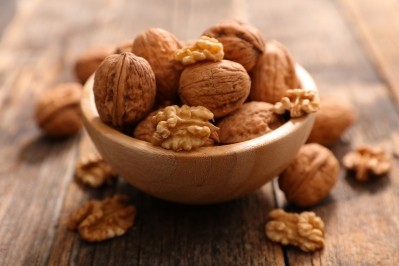The walnut-microbiome interaction may influence cardiovascular health

The findings, which appeared in the journal Clinical Nutrition, showed that a walnut-enriched diet expressed two metabolism-related genes—glycine amidinotransferase and arginine deiminase. These enzymes are involved in metabolic pathways that may impact cardio-protection. Additionally, the results of the study expand the understanding of walnut-related modulation of the gut microbiome, according to the researchers.
“Our results suggest walnut intake may increase endogenous production of homoarginine through gut microbiota-mediated upregulation of GATM (glycine amidinotransferase),” the researchers wrote. “[This] is a novel mechanism by which walnuts may lower cardiovascular disease risk.”
Preventing cardiovascular disease
Cardiovascular disease (CVD) is the leading cause of death globally, and dietary factors are associated with more than half of all CVD-related deaths. Evidence suggests the gut microbiome may contribute to the development of CVD, according to the researchers.
In the study, the scientists included a meta-analysis of 26 controlled trials that showed walnut-enriched diets improve total cholesterol, triglycerides and apolipoprotein B (a protein that helps carry fat and cholesterol through the body) compared to control diets.
“Walnut consumption also affects gut microbiota composition,” the researchers noted. “We previously demonstrated using 16S rRNA sequencing that a walnut-containing diet enriched bacteria is known to be involved in short chain fatty acid production as well as ellagitannin metabolism.”
They added: “Regular nut consumption is inversely associated with CVD risk, and randomized controlled trials show nuts improve major risk factors for CVD including lipids and lipoproteins. Strong evidence shows walnut intake improves major risk factors for CVD.”
Study details
The study included 35 participants whose stool samples were analyzed after they were given either a walnut diet (WD), a walnut fatty acid-matched diet (WFMD) or an oleic acid replaces alpha-linolenic acid diet (ORAD). The WD contained 18% of energy from walnuts (57 g/d/2100 kcal). The WFMD and ORAD were devoid of walnuts.
The researchers used a process called metatranscriptomics to gauge a comprehensive profile of gene expression and to estimate the function of the microbiome.
“To the best of our knowledge, metatranscriptomics has not been used previously to assess the effect of walnut consumption on gut microbiota functionality,” they wrote.
As a result, they relied on a secondary analysis using samples from a previously conducted randomized, crossover, controlled-feeding trial to characterize the effect of a walnut-enriched diet on microbial gene expression.
Findings revealed a greater expression of the glycine amidinotransferase by Gordonibacter for those on a walnut diet. Gordonibacter are part of the human gut microbiota and can metabolize dietary polyphenols (including ellagitannins) into bioactive metabolites known as urolithins. Previous research has shown that urolithins may influence cardiovascular health, including hypertension, atherosclerosis, myocardial infarction, myocardial ischemia-reperfusion, cardiac fibrosis, arrhythmia and myopathy.
Source: Clinical Nutrition
doi: doi.org/10.1016/j.clnu.2023.09.023
“Walnut consumption and gut microbial metabolism: Results of an exploratory analysis from a randomized, crossover, controlled-feeding study”
Authors: Kristina S. Petersen et al.














